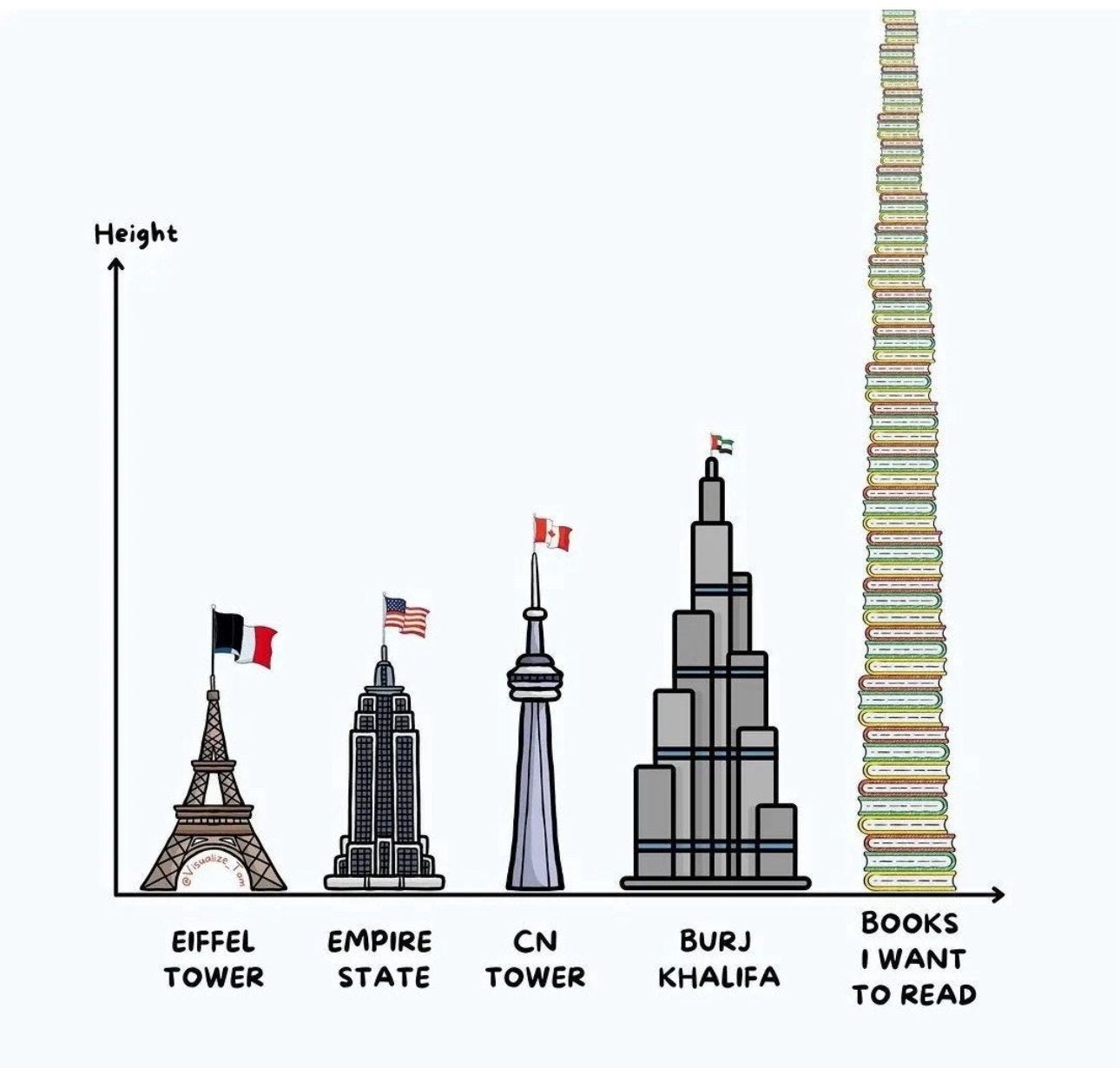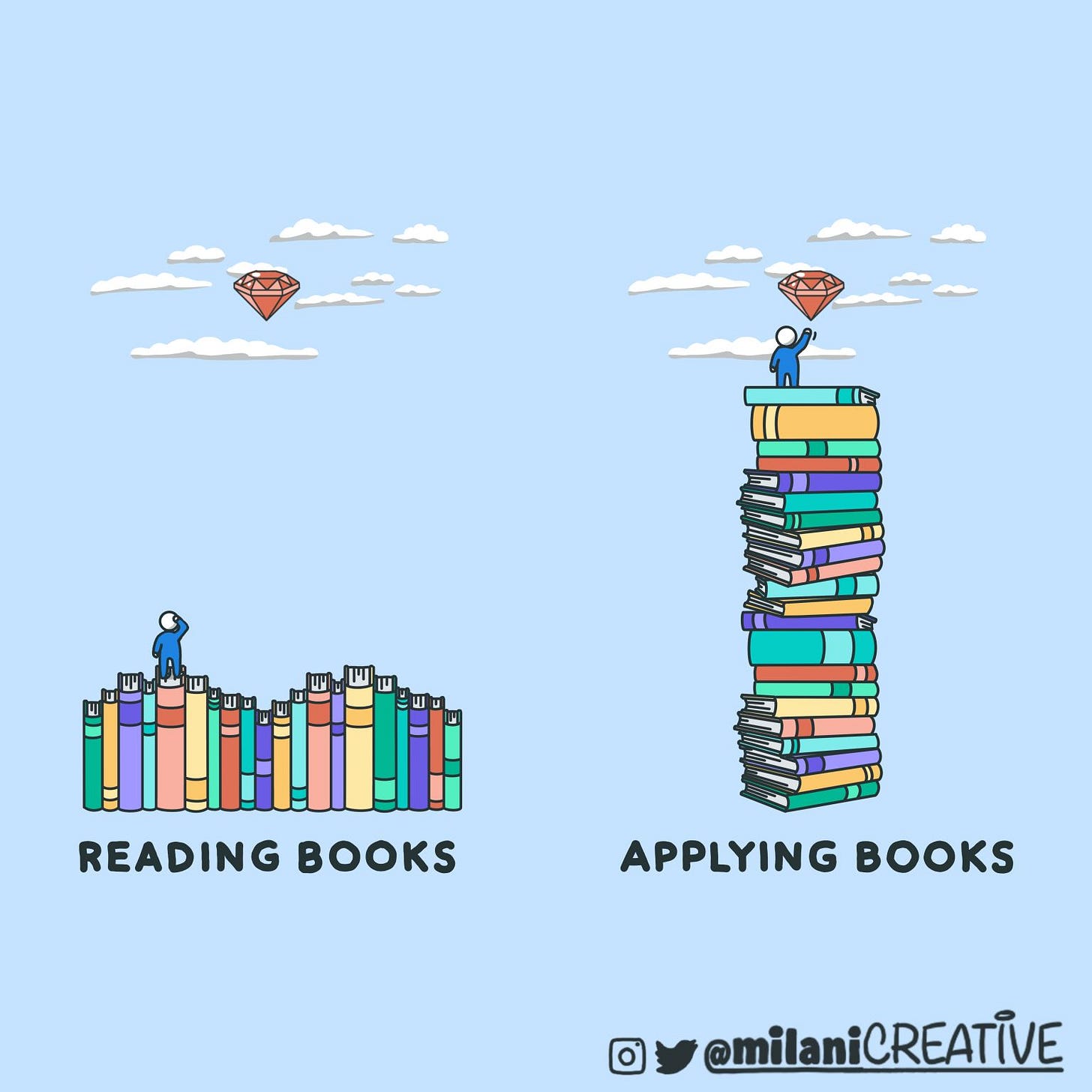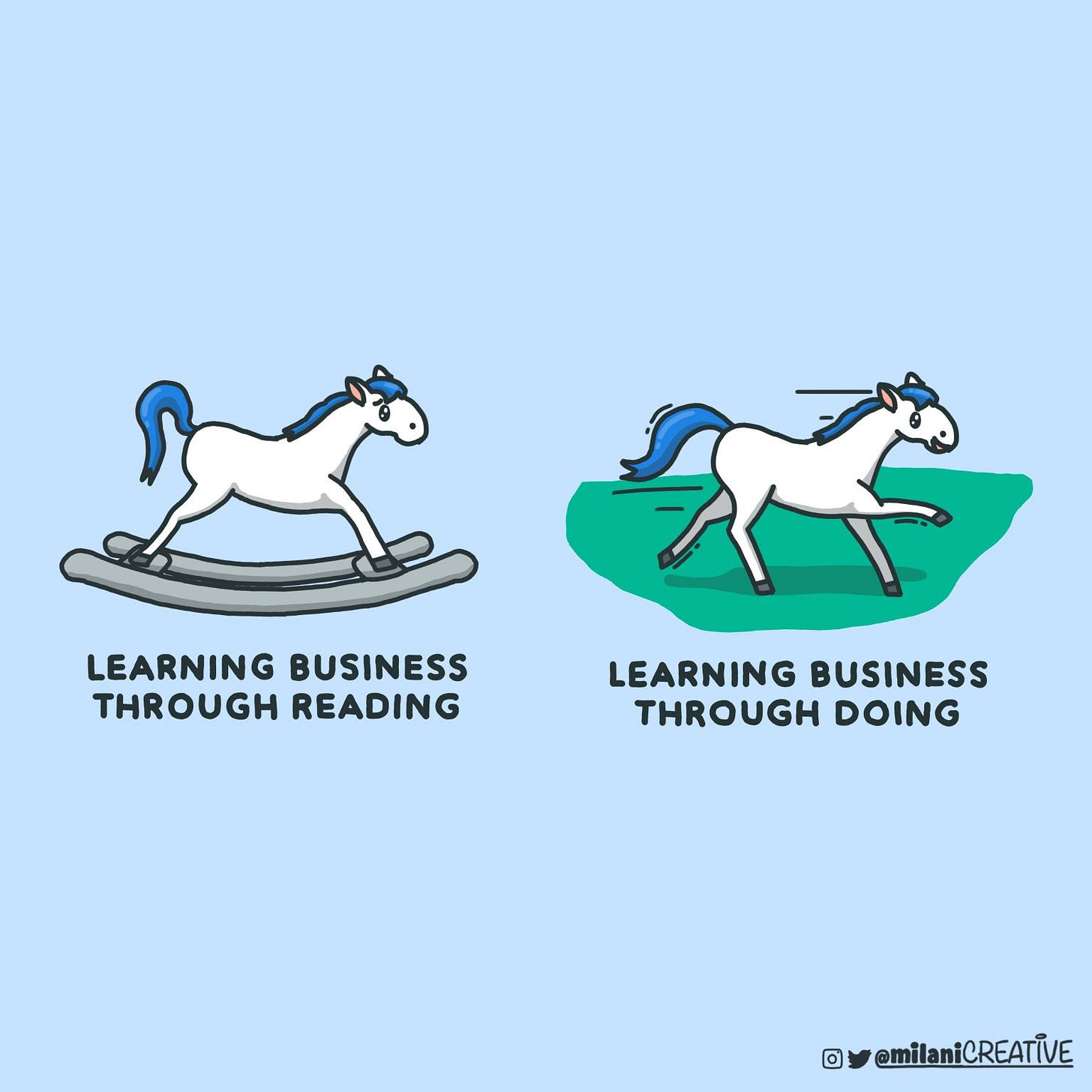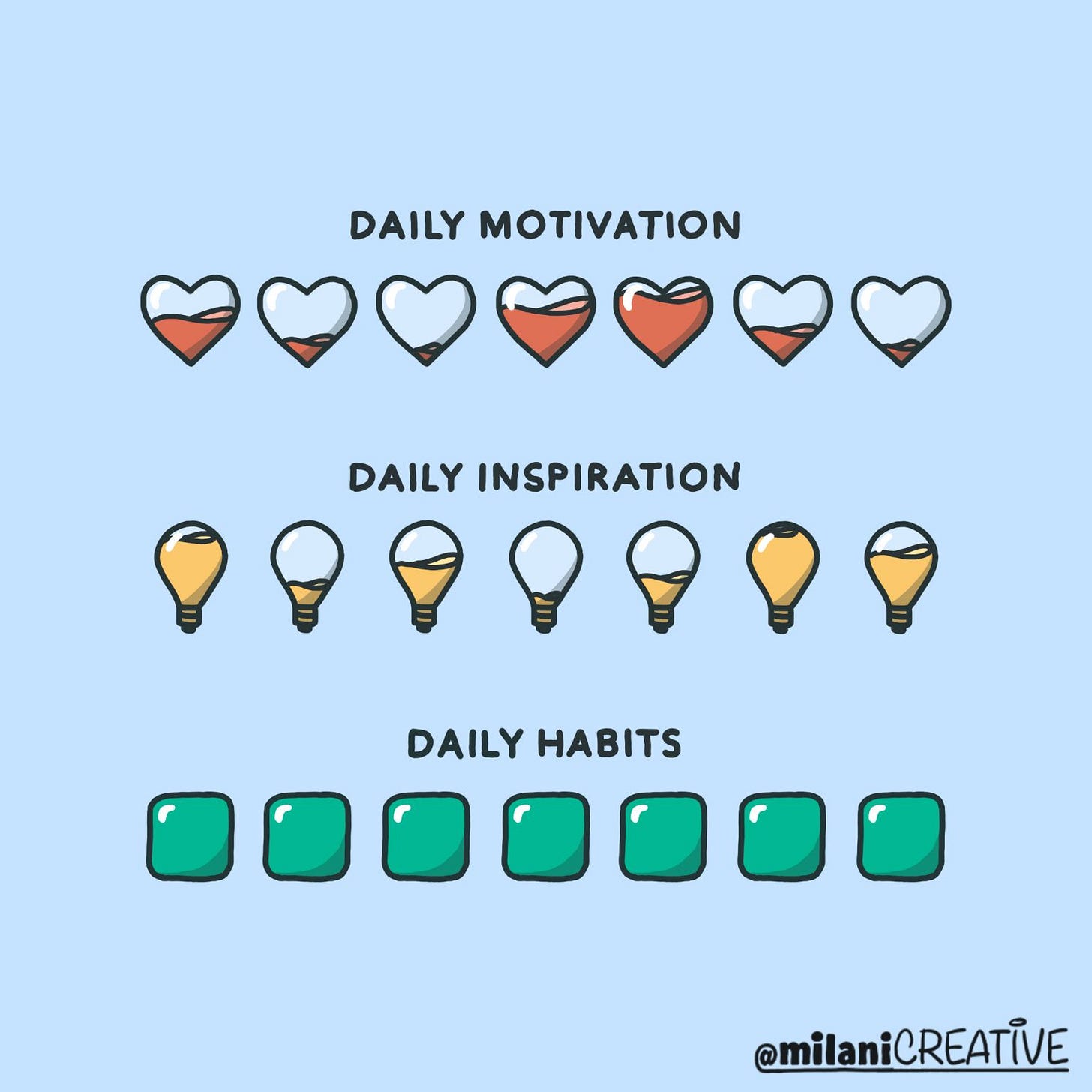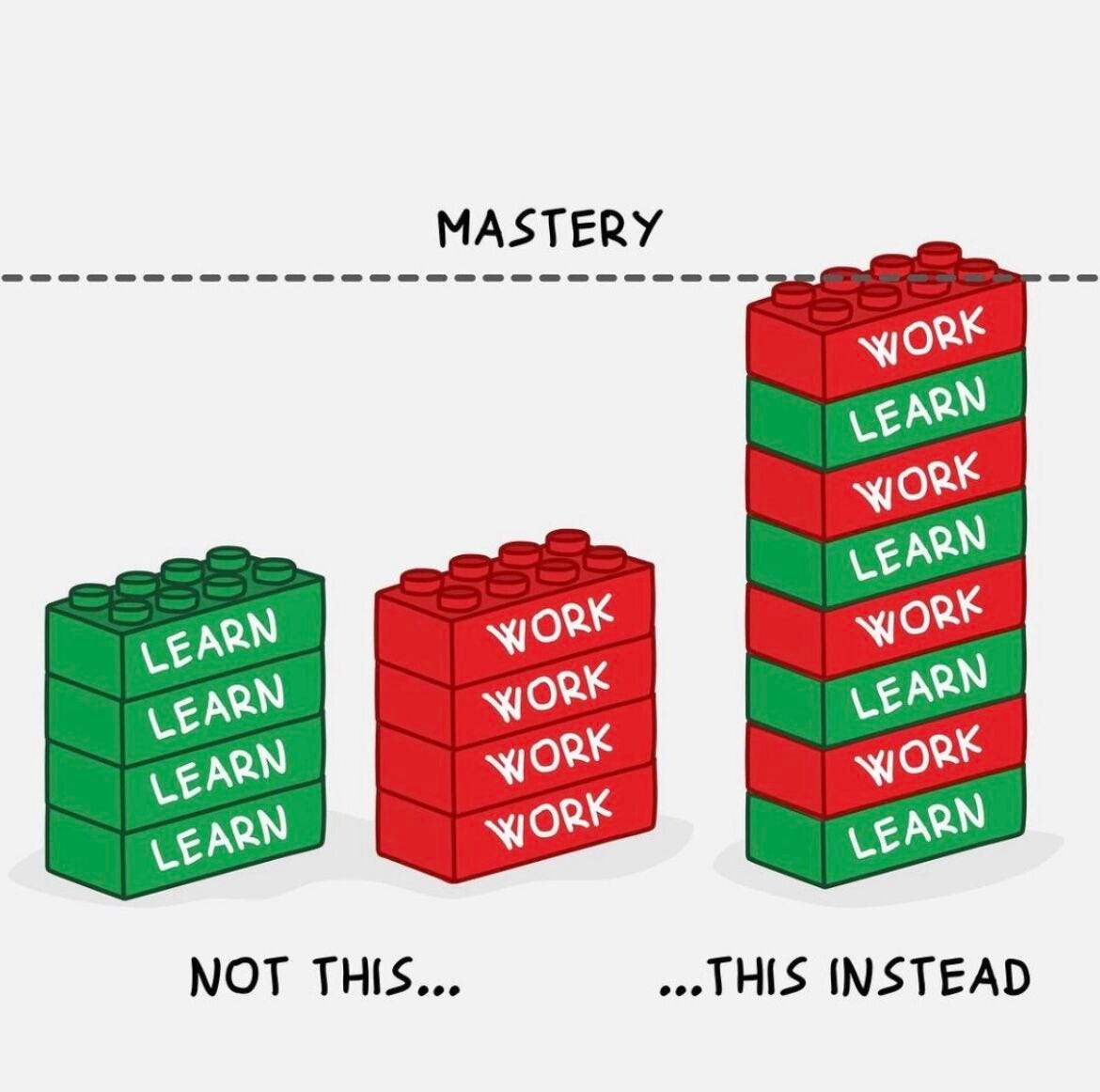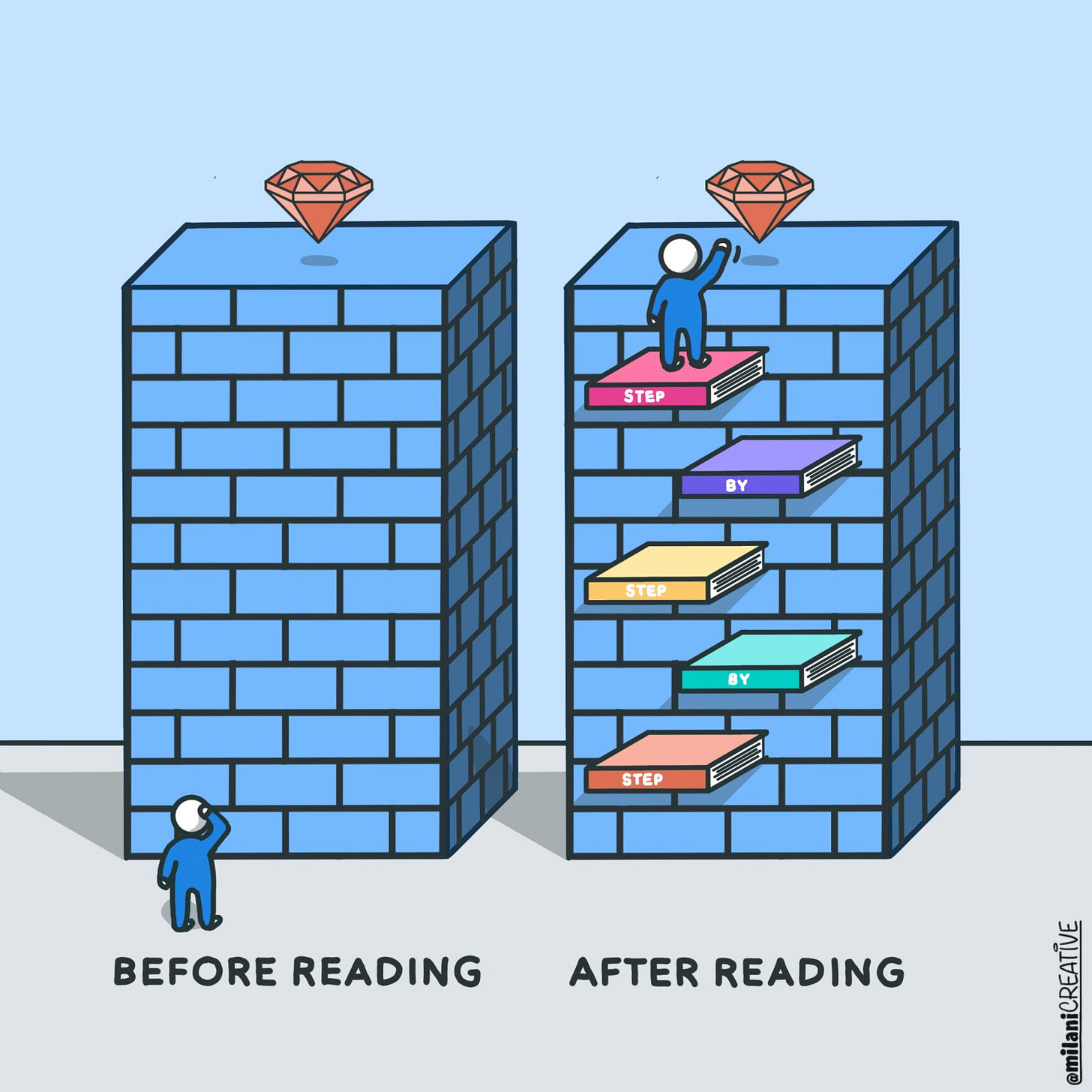Some people read 50+ books per year. I read 5 at best! But it wasn’t always like this.
I used to read a lot, but there was always more to read.
Reading books is one of the greatest ways to acquire knowledge. It feels good to know and that’s exactly why many are addicted to books. There is such thing as “too much reading” and here are some symptoms:
Craving to read a similar book not too long after finishing one
Having not internalized the knowledge to shape behaviors and not practicing the wisdom of the book
Name dropping and quote dropping out of context mostly shift the burden of proof to the author of a book that’s external to a given situation
Not being able to recall key points from a book read in the past
Brag about the “score” (vanity metrics like number of the books read per year, number of hours spent reading, etc.)
I used to read quantities
As a kid I had access to my dad’s large bookshelf. I used to build book towers with hard-covers and get lost in the world of pictures and illustrations before I could read. My dad, a university lecturer, author, and avid reader used to say:
People have many ideas, but they only talk about a few. Out of those spoken ideas, only the greatest are written down. And only a few written ideas get published. Books contain the distilled wisdom of humanity.
I grew up to be a bookworm with a big bookshelf of my own. I regularly hung out at the bookshops to hunt for new ones. Up until I got a kindle back in 2013, I bought hundreds of books per year and read at least half of them cover to cover.
With Kindle, everything changed. The convenience of effortlessly discovering new books, buying them with the touch of a button and reading them on a device that’s made for distraction free reading experience was one of the best things ever happened to me. Plus, I could carry my entire digital bookshelf with me.
I still bought some paper books but not as many as the digital ones. Later I came across Audible and bought many audio books too. For years I listened to audiobooks while commuting and before going to bed.
With all the paper books, kindle books and audible books I bought, I had a humble role in sending Jeff Bezos to space!😁
The incident that changed it all
4 years ago, I started working with a 3D web application. I looked at my bookshelf to see if I’ve got something about it and sure enough, I still had a paper book about that.
As I browsed the book, I saw that I had underlined many pages and even left some sidenotes (this was a habit I had with paper books but gave up on Kindle).
If I knew enough of the topic to have taken notes, I should have remembered reading the book. I didn’t! The book itself was printed in 2014 so I knew I must have read it sometime between 2014 to 2018, but I had no recollection of it whatsoever.
It was the kind of book that had coding exercises. Maybe I had read it too shallowly without doing the exercises. So, I searched my NAS and sure enough, I had some exercise code from the book in my backups.
It was a scary discovery. And a bit sad. As far as I was concerned, this was time wasted. And I asked myself: how many other books had I forgotten?
One possible reason is because I used to read fast. I even read a couple of books about how to read faster. That’s a habit from the time I was focused on gulping in as many books as possible: quantity-driven reading.
Something had to change.
Quality not quantity
That incident fundamentally changed my approach to reading. Instead of quantity, I switched focus to quality.
I carefully select only a few books and read them inside out. Multiple times. I read Kindle books on the computer and took notes in an app on my phone. Occasionally I buy the whispersync audio version and even the paper version of the book. I don’t want the medium to limit how I consume the content. With fewer books, I still spend less money buying different formats.
I no longer measure or break any quantitative records like the number of pages per week or number of books per year.
I only read when my brain can absorb new knowledge. I don’t listen to audiobooks when I cannot solely focus on the book. And when I read, I am very slow! I spend more time reflecting and digesting what I read. I read a little, think a little, take notes if needed and repeat. Sometimes I read the same paragraph multiple times to internalize what I’m reading. I prioritize understanding and critical thinking over vanity metrics. 🤔
This way, the information gets a better chance to sink in. And when a book is finished, I take a break before moving to another one. I will reread a book after a while just to refresh my mind and reflect on the new knowledge and experience that I’ve acquired after the last round.
I haven't read many books since 2018, but the ones I read, I understand very well. That’s why I’m picky about what book I invest in.
That is not to say that I read every book so slowly. Occasionally I come across a book that isn't worth rereading or even finishing. I still do shallow reading but mostly when it comes to news and trivial blog posts. ⌛
Quantity can be dangerous
When it comes to learning, quantity is not just a vanity metric, it can be downright dangerous.
Let’s see some examples:
Bob says something that doesn’t align with what Alice has read in a top-selling book. Alice’s brain automatically categorizes Bob as an idiot and shuts her ears to whatever Bob has to say. It prevents Alice from understanding Bob’s world, his concerns, values and how his ideas came to be.
Bob has picked up a few great ideas from multiple books and can confidently sound smart! Bob gets promoted at a mediocre company betting on him to lead the rest to a better world. A year into the new position, it turns out Bob doesn’t have a clue. He is full of quotes but not too much substance. The company lost a year, morale is low, and some key employees have left.
Alice is facing a new and interesting challenge at work. Being the book nerd she is, she’s trying to do the best thing for her company and starts reading most of the books available in that realm. Time goes by and Alice hasn’t taken any action. She’s busy reading and coming up with a perfect plan. This is what Matt Sandrini calls “infocrastination”: “Looking for more information is often a buffer to put off taking action and avoid any possible mistake. Reading a book is safe, taking action is hard.”
Bob is a hard-core fan of leadership, management and “agile” books. He loves to read about how great managers “turn the ship around”. But at his day job, he has little success even nudging the ship. Unless we reach Matrix level knowledge transfer, written words (or even multimedia) can only transfer part of the author’s knowledge. Bob needs to put the book aside and gain some experience for the situation he is in and maybe write a book of his own someday. Bob thinks his ship is too bulky to move and switches ships (jobs) hoping for better luck.
Alice just finished a great book about how Google uses OKRs to align the focus of the organization. So, she starts cargo culting what worked at Google at her mid-size company where software is not a first-class product. Equipped with smart words and the wisdom of the book, Alice manages to convince the leadership to set some OKRs but the developers who are responsible to measure and act to those metrics see no value. Even when they do measure, Alice has little to no practical methodology to make the best out of it. Everyone grows out of OKRs. Everyone but Alice. Alice knows that every quarter she should scream louder till others “get it”.
Bob is a C-level leader. He has a set of dogmatic principles that are never to be broken. He kindly formulated them into short proverb-like chunks that are easy to remember and quote. “Don’t build what you can buy”, “if you don’t trust the data, bring your own data”, “nail it before scale it”, “if you can’t measure it, it isn’t worth improving”, etc. These quotes are supposed to contain distilled wisdom but unfortunately, they are often used to evaluate complex situations to make the right decisions. Frustrated by the confused org, he buys a copy of his favorite book for the entire organization. The hypothesis is that “if you drop your favorite books on people, they’ll grow to become your favorite people”. The company loses time and money while more people become like Bob: experienced in the world of the author, confused in the reality of their company’s world.
Alice was depressed many years ago until she came across a self-help book that made her feel better. After finishing the book, the old feelings crawled back to her life as well as the old habits that drove her into depression. She managed to keep them at bay by reading more self-help books. She even went to self-help seminars. Most people saw her as a confident, smart and joyful person to be around. She saw her self-help book addiction as a medicine, a tax to feel good. She made a commitment to read at least 10 pages per day to “get high”. Only a handful of very close friends knew that deep inside, she was still struggling. Alice herself denied it because “to make it, you have to fake it”. Unfortunately, the worst lie is the one we tell ourselves. No one saw it coming when Alice took her life. Had she sought medical help instead of covering it up with books, probably she would have survived.
Bob and Alice are fictional names, and this is not a DM but I can go on writing more scenarios where a quantity driven shallow reader gets hurt or worse: hurt others.
Learning < Practice
When I used to read a lot, it was common to crave more when I was done with one book. I rarely gave myself the time to internalize what I had just read and practice to master it.
What I needed wasn’t more inspiration or insight. It was to build new habits based on what I learned.
Motivation is what gets you started. Habit is what keeps you going. —Jim Rohn
Summary test
Reading books is no guarantee to make one smarter. One can easily fall victim to the illusion of knowledge. Combine that with the Dunning-Kruger effect and you get someone who knows enough to be confident but unwise enough to cause catastrophic damage.
Without taking the time to internalize a book’s ideas and giving the brain a chance to rewire itself, the new knowledge remains external to the brain (one symptom is not being able to remember it, like in my case). One way to make the new learning useful is to act on it.
One does not have to wait to learn everything before using it in work. It’s in fact better to learn and act on learning incrementally.
If a person cannot write an accurate summary of the book that doesn’t pass by the author, they haven’t understood it.
If you liked a book in the past, try to write a summary to see how much you remember. If you don’t remember much, maybe it’s time to reread it.
Diversity
If you read many books there's a good chance that the same message may be repeated over and over again. That’s because a good book is a bit like a magnet: it attracts similar books to you (or you to them, depending on how you look at it 😁).
To acquire better wisdom, you can read books with opposite views to actively expose your brain to different sides of the argument. Nonetheless, there is a likelihood that if you haven’t really understood one view, you will have a hard time analyzing and evaluating the second one or be biased toward the view that’s presented or elaborated better.
You don’t need too many books to learn more, you need the right books (efficiency) with the right combination (effectiveness).
Tips
It is better to read some books than none.
Too many books can lead to the opposite effect. Read in moderation.
There’s a point of diminishing return when reading the same type of book. Diversify what you read.
The pace of reading varies from person to person but also for the same person depending on what else is going on in their lives as well as the type of the book. Don’t measure pace. Focus on quality.
Slow reading (reflecting on the insights) is better than fast reading.
Slow reading does not mean spending less time reading, but striving to get deeper.
If you can’t remember audiobooks that were read to you, stop filling your “free” time with them. Set aside some focused time to listen distraction-free.
Dedicate focused time to reading for maximum efficiency
References
If you’ve read this far, maybe you can help me learn something new by sharing your thoughts and counter-arguments. 🙏You can also follow me on LinkedIn. I write about technical leadership, software, growth and productivity.



